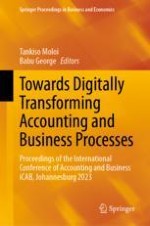2024 | Buch
Towards Digitally Transforming Accounting and Business Processes
Proceedings of the International Conference of Accounting and Business iCAB, Johannesburg 2023
herausgegeben von: Tankiso Moloi, Babu George
Verlag: Springer Nature Switzerland
Buchreihe : Springer Proceedings in Business and Economics
